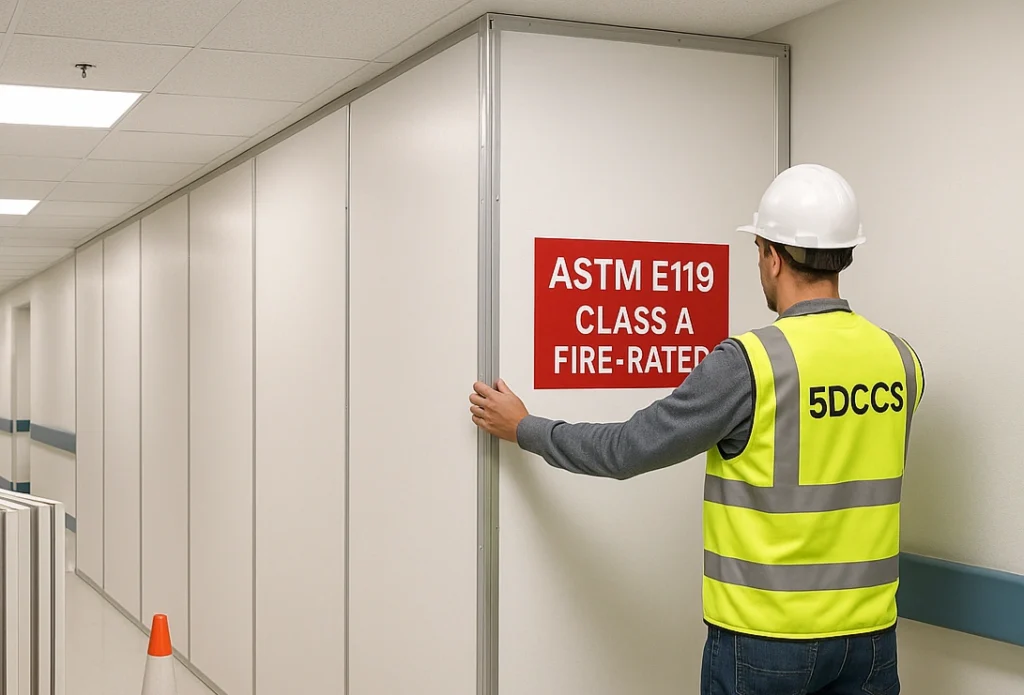Sustainable Modular Temporary Walls from a California-Based Containment Provider

Sustainable modular wall systems are transforming California construction by cutting waste, lowering emissions, and complying with strict environmental regulations.
Fire-Rated Temporary Walls on Jobsites: Compliance, Safety & Efficiency

Fire-rated temporary walls aren’t just dividers—they’re your front line for code compliance, jobsite safety, and uninterrupted workflow. Discover the smarter way to build.
How to Speed Up Renovations Without Compromising Safety

Renovation projects often struggle with the balancing act of speed versus safety—especially in sensitive environments like hospitals and commercial buildings. Fortunately, modern solutions like modular containment systems help contractors and facility managers speed up renovations safely while maintaining compliance and minimizing disruption.
Beyond Healthcare: Industries Benefiting from Temporary Wall Solutions

Temporary wall solutions are often associated with healthcare settings, but their benefits extend far beyond hospitals and clinics. From schools and retail stores to industrial plants and office buildings, these versatile barriers help maintain safety, minimize disruption, and streamline projects. Let’s explore how multiple industries are making the most of modular containment walls.
How to Plan for Temporary Containment During Renovation

Renovations can be disruptive, but they don’t have to stop your business. Temporary containment is important for keeping a clean, safe, and efficient workspace during projects. At Construction Containment Services, we specialize in modular wall systems that control dust, noise, and debris. This guide highlights key points for planning your temporary containment solutions, ensuring minimal disruption and safety compliance. Whether you’re renovating an office, medical facility, or commercial space, learn how to keep your operations running smoothly while improving indoor air quality and safety. Start planning your containment today!
Essential Tips: Temporary Wall Panels Reduce Noise

When construction occurs in occupied spaces like hospitals, offices, and airports, noise control is crucial. Loud tools and equipment can disrupt staff and violate sound ordinances. That’s where temporary wall panels come in. At 5DCCS, our modular wall systems not only block off areas but also absorb and reduce sound, ensuring a professional and quiet environment. Discover how our noise-reducing solutions can enhance tenant satisfaction, improve working conditions, and maintain focus during renovations. Don’t let noise disrupt your next project—learn more about our effective containment solutions today!
Why Renting Temp Wall Panels Is the Smart, Insider Choice for Construction Projects

🌐 www.5dccs.com 📧 info@5dccs.com 📞 (855) 684-3752 In today’s fast-paced construction environment, keeping job sites clean, compliant, and efficient is non-negotiable—especially in occupied or sensitive facilities. Whether you’re working inside a hospital, office building, school, or airport, temporary containment is often required. That’s where temp wall panels come in. Modular, reusable, and easy to install, these systems provide an […]
Why Working with Construction Containment Services Means Real Value for Your Project

Discover how partnering with Bay Area contractors for modular containment, temporary walls, and construction barriers ensures a clean, sustainable, and professionally set up jobsite.
